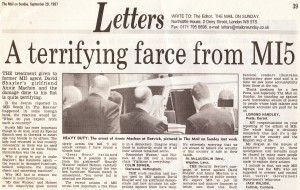 For the first time a serving head of a major intelligence service in the UK, Andrew Parker the Director General of the UK domestic Security Service, has given an interview to a national newspaper.
For the first time a serving head of a major intelligence service in the UK, Andrew Parker the Director General of the UK domestic Security Service, has given an interview to a national newspaper.
Interestingly, he gave this interview to The Guardian, the paper that has won awards for publishing a number of the Edward Snowden disclosures about endemic illegal spying and, for its pains, had its computers ritually smashed up by the powers that be.
The timing was also interesting — only two weeks ago the Investigatory Powers Tribunal (the only legal body that can actually investigate allegations of spy crime in the UK and which has so far been an unexceptional champion of their probity) broke ranks to assert that the UK spies have been illegally conducting mass surveillance for 17 years — from 1998 to 2015.
This we could all deduce from the disclosures of a certain Edward Snowden in 2013, but it’s good to have it officially confirmed.
Yet at the same time the much-derided Investigatory Powers Bill has been oiling its way through the Parliamentary system, with the culmination this week.
This “Snoopers’ Charter”, as it is known, has been repeatedly and fervently rejected for years.
It has been questioned in Parliament, challenged in courts, and soundly condemned by former intelligence insiders, technical experts, and civil liberties groups, yet it is the walking dead of UK legislation — nothing will kill it. The Zombie keeps walking.
It will kill all notion of privacy — and without privacy we cannot freely write, speak, watch, read, activate, or resist anything future governments choose to throw at us. Only recently I read an article about the possibility of Facebook assessing someone’s physical or mental health — potentially leading to all sorts of outcomes including getting a job or renting a flat.
And this dovetails into the early Snowden disclosure of the programme PRISM — the complicity of the internet megacorps — as well as the secret back doors what were built into them.
It will be the end of democracy as we (sort of ) know it today. And, as we know from the Snowden disclosures, what happens in the UK will impact not just Europe but the rest of the world.
So how does this all link into the MI5 head honcho’s first live interview? Well, the timing was interesting — ahead of the Investigatory Powers Bill passing oleaginously into law and with the ongoing demonisation of Russia.
Here is an interview I gave to RT about some of these issues:
Commentary on MI5’s first nwspaper interview from Annie Machon on Vimeo.



